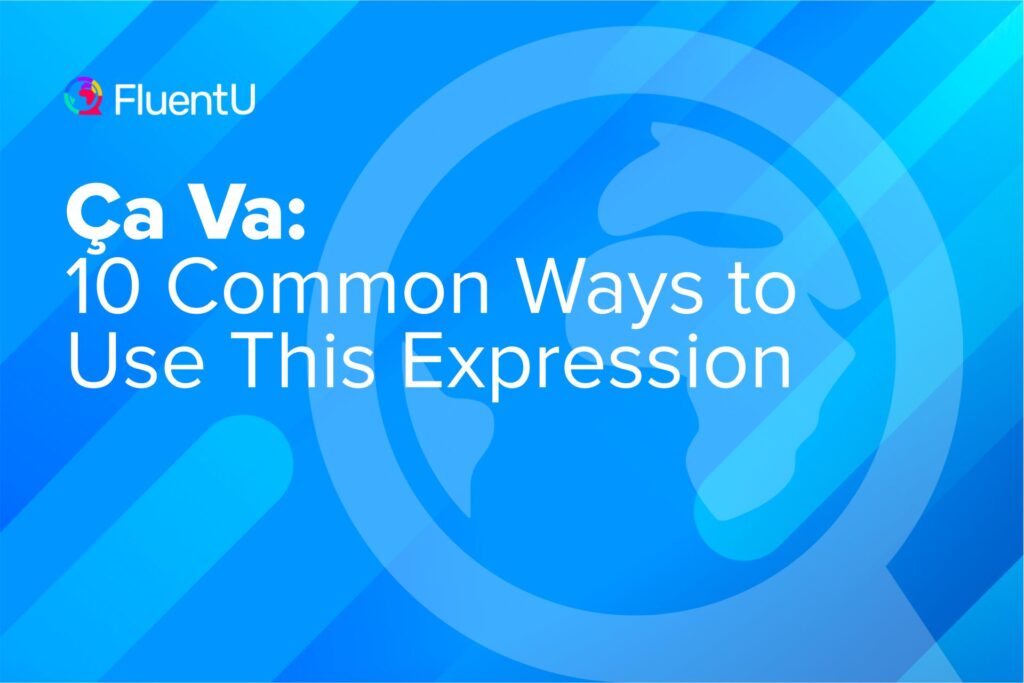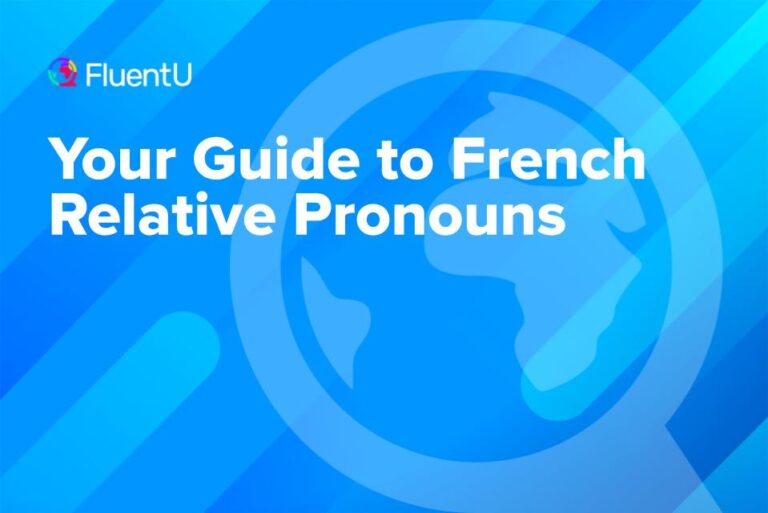Contents
- The Straightforward Meaning of Ça Va
- Ça Va as a Response
- Ça Va and Fashion
- Using Ça Va to Call in Sick
- Totally in Agreement with Ça Va
- Everything Will Be Alright Using Ça Va
- Ça Va with Plural Nouns
- Using Ça Va to Say Sparks Will Fly
- Shooting Someone Down (Figuratively) with Ça Va
- Practicing Ça Va
- And One More Thing...
Ça Va: 10 Common Ways to Use This Expression

Ça va is one of the first things you will encounter as a débutant (a beginner) in French. Ca va is common and versatile, and it’s used in a variety of different ways in French.
So let’s take a look at this small but mighty expression.
Download: This blog post is available as a convenient and portable PDF that you can take anywhere. Click here to get a copy. (Download)
The Straightforward Meaning of Ça Va
The literal translation of ça va is “it goes” or “that goes.”
This expression is most commonly used to ask how someone is doing, even if you’re not necessarily expecting a reply.
Salut, ça va ? (Hi, how are you? / How are things? / How is it going?)
This expression is informal, so you wouldn’t really use it for people you’d address with vous (you—formal/plural) rather than tu (you—informal/singular).
I will be using the latter for the rest of the article, as well as occasionally dropping the ne in the negative, which is often done in informal conversations.
Ça Va as a Response
Ça va in the positive
If someone asks you how you’re doing, you can simply respond with ça va in a neutral or positive tone of voice (if you are feeling that way, of course):
Ça va. (I am fine. / Everything is good.)
You can also add a positive adverb such as bien (well):
Ça va bien. (Things are going well.)
Ça va in the negative
Many French learners think that the expression comme si, comme ça (like this, like that) is the appropriate thing to say if you’re feeling “so-so.” While this is understandable to French native speakers, it’s not really used that often.
You are more likely to hear ça va in the positive form but spoken in a tone of voice that indicates the speaker is not feeling wonderful for whatever reason.
If you want to be more explicit about your negative feeling, you can simply respond with:
Ça va pas. (Everything is not good./I am not okay.)
In writing, you would say: Ça ne va pas.
Another way to express this by using the adverb mal (badly).
Ça va mal. (Things are not going well.)
Ça Va and Fashion
Does this dress make me look fat?
Before we strike a pose, did you know that the va in ça va is the third-person singular of the verb aller (to go)?
Aller à (qqn) is used when you want to say that an item of clothing suits or looks good on somebody.
Let’s imagine that I have just walked out of a fitting room in a rather becoming pair of trousers. We are close friends (i.e., we use tu) and you want to compliment me on my astute fashion sense by saying, “Hey, those trousers look great on you!”
In which case, you can say:
Ça te va bien ! (That really suits you!)
Or if you think I look hideous but want to be polite and honest:
Ça te va pas. (That does not suit you.)
Using Ça Va to Call in Sick
Whether you are too tired the next day after an exhausting trouser shopping spree or are genuinely feeling a bit under the weather, there are two nifty expressions you can use, especially if you need to call out of work:
Je ne me sens pas bien. (I do not feel well.)
Ça ne va pas. (I do not feel well.)
Let’s look at a possible exchange between you and your boss:
Boss: Bonjour __, c’est très tôt, ça ne va pas ? (Hello__, it is very early—is there something wrong? / Are you sick?)
You: Oui monsieur / madame, ça ne va pas du tout. Je crois que j’ai une gastro-entérite. (Yes, Sir / Madame, I do not feel well at all. I think I have gastroenteritis.)
Totally in Agreement with Ça Va
Ça va is also used when you want to know if what you are suggesting is acceptable to someone else.
You can say it at the start of the sentence:
Ça va si j’achète cette voiture ? (Is it okay if I buy this car?)
Or at the end of a sentence as a quick confirmation:
Je veux y aller ce soir, ça va ? (I want to go there tonight—is that alright?)
Let’s look at some more examples:
Ça va si je m’assois là ? (Is it alright if I sit there?)
Je peux manger le sandwich qui reste, ça va ? (Can I eat the leftover sandwich—is that okay?)
If you’re writing in French, you would use ça te va for these examples.
Everything Will Be Alright Using Ça Va
Ça va can be used to mean that something will happen.
The construction ça va + infinitive indicates that something will happen in the future.
Let’s say you are having a really bad day—you got a parking ticket, spilled soda down the front of your shirt before a meeting and dropped your front door key down a deep crack in the sidewalk.
You are feeling low and decide to share the story of your day with a friend.
In this situation, they might respond with something like:
Ça va passer. (It will pass.)
Ça va aller. (It will be alright.)
You can of course alter the meaning to say that something will happen in a negative sense using mal (badly) as we have encountered before:
Ça va mal finir. (It is going to end badly.)
Ça Va with Plural Nouns
Ça va can be used to ask how everyone is doing.
As important as agreement is in French, this is one situation when learners can happily throw the rulebook out the window.
So, if there is a whole group of guys at a party and you want to ask how all of them are doing, you can walk in and say:
Ça va les gars ? (How is it going guys?)
Notice that les gars is plural, but the verb does not conjugate to agree with this.
Another example situation where ça va can be used in this way is when a parent comes into their daughter’s bedroom to ask how her homework is going:
Comment ça va les devoirs ? (How is the homework going?)
Using Ça Va to Say Sparks Will Fly
There are a few expressions beginning with ça va that indicate that a future situation is going to be difficult or heated:
You: Mais qu’est-ce qui se passe ? (What is happening?)
Friend: Jean a encore joué un tour à Pierre. Ça va barder. (Jean has played another trick on Pierre. Things are going to get heated).
Ça va barder / Ça va chauffer (sparks will fly / things are going to get heated) build upon what we have already established in terms of using ça va to talk about the future.
This usage is more advanced because you’re going beyond learning grammar to using the language more naturally through everyday expressions.
Shooting Someone Down (Figuratively) with Ça Va
There are times when someone is being hypocritical and can’t justify what they are saying.
Maybe your friend is always making fun of how tasteless your baking is when they cannot even bake themselves!
In English, we might say something like: “That’s rich coming from you!” or “You can talk!”
You can express this idea in French with ça va:
Ça te va bien ! (Figuratively—that is rich coming from you!)
Notice this is exactly the same turn of phrase as in the point about fashion. It is all about the way you say it here.
Practicing Ça Va
By now you are hopefully feeling a bit clearer about the multiple uses of ça va—our nifty, all-purpose friend. How can you practice this expression so you can use it yourself?
You should aim to see ça va used in actual native content for more context. This is the media that native French speakers would consume, like French books, music and TV shows. FluentU is particularly helpful for finding authentic French videos.
FluentU takes authentic videos—like music videos, movie trailers, news and inspiring talks—and turns them into personalized language learning lessons.
You can try FluentU for free for 2 weeks. Check out the website or download the iOS app or Android app.
P.S. Click here to take advantage of our current sale! (Expires at the end of this month.)
They’re also likely to feature realistic conversations that make good use of common expressions. Look out for ça va (you probably won’t have to search for too long) and note the scenario in which it’s used.
Of course, it’s also greatly helpful to have a “language buddy” who can help you practice ça va in casual conversation.
Ça va is not as daunting as you might have originally thought, right? It is actually easier to use this expression correctly than not.
Now, all you need to do is go out there and start using ça va like a Parisian pastry chef!
Download: This blog post is available as a convenient and portable PDF that you can take anywhere. Click here to get a copy. (Download)
And One More Thing...
If you like learning French at your own pace and from the comfort of your device, I have to tell you about FluentU.
FluentU makes it easier (and way more fun) to learn French by making real content like movies and series accessible to learners. You can check out FluentU's curated video library, or bring our learning tools directly to Netflix or YouTube with the FluentU Chrome extension.
One of the features I find most helpful is the interactive captions—you can tap on any word to see its meaning, an image, pronunciation, and other examples from different contexts. It’s a great way to pick up French vocab without having to pause and look things up separately.
FluentU also helps reinforce what you’ve learned with personalized quizzes. You can swipe through extra examples and complete engaging exercises that adapt to your progress. You'll get extra practice with the words you find more challenging and even be reminded you when it’s time to review!
You can use FluentU on your computer, tablet, or phone with our app for Apple or Android devices. Click here to take advantage of our current sale! (Expires at the end of this month.)











